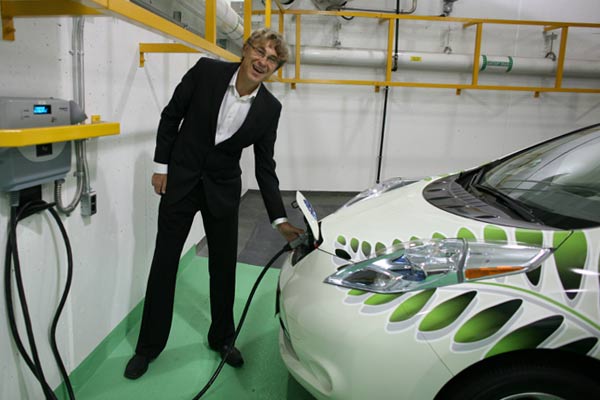
Foregoing fossil fuels
Published: October 19, 2011
Looking both ways before you cross the street is even more important in the new age of electric cars.
These silent vehicles are making their way onto roads worldwide and the University of Toronto’s St. George campus is no exception. Facilities and Services has recently purchased three electric vehicles for its 50-vehicle fleet, replacing three vehicles that were at the end of their lifespan.
Environmental Benefits
“It’s part of our mandate to reduce our environmental footprint,” said Mark Simpson, director of building services, grounds and trades. “Cars and trucks contribute about 25 per cent of Toronto’s gas emissions. It’s important for us to be on the leading edge and set an example for others to follow.”
In conjunction with the purchase, the university has forged a partnership with the Toronto Atmospheric Fund and is taking part in its electric car trial. Simpson will provide the fund with data collected from each of the university’s three new vehicles to help its staff determine how well the new technology works and identify some of the benefits and problems. Toronto Hydro, another partner in the trial, will examine how electric vehicle use affects the grid.
The university purchased three different vehicles – the three available in Canada at present – in order to see which is most viable for campus use. There is a Ford Transit Connect van and two cars: a Nissan Leaf and a Chevy Volt.
Long-Term Economic Benefits
Simpson says the vehicles are ideal for the U of T fleet, since they have a range of 120 kilometres per charge and they will be used on average 20 to 30 kilometres daily. The three vehicles will be recharged at a charging station in the Bahen Centre, a process that takes four to six hours. In an emergency, they can be plugged into any 110-volt outlet and will be fully charged in 15 hours.
It’s a long time to wait compared to a quick visit to the gas station, but the cost per kilometre is nine cents, compared to the 52 cents per kilometre to fill a van with gas; electric vehicles also offer a 90 per cent reduction in CO2 emissions. Simpson is optimistic that charging times will drop as electric cars become more popular.
“I expect major developments in battery technology over the next few years,” he said.
They are more expensive than the gas-fuelled vehicle -- $62,000 for the van and $41,000 for each car – but the university will receive an $8,500 rebate per vehicle under the province’s green incentive program. Simpson says fuel and maintenance costs will also drop substantially.
“The provincial government has been pushing for reduced emissions,” said Simpson, “and this helps position the Greater Toronto Area as a leading adopter. U of T felt is needed to be a leader in this respect.”
Staff members are quite excited by the newest additions to the fleet.
“We brought the electricians down and they were crazy over it,” said Simpson. “They were busy poking around under the hood.”



